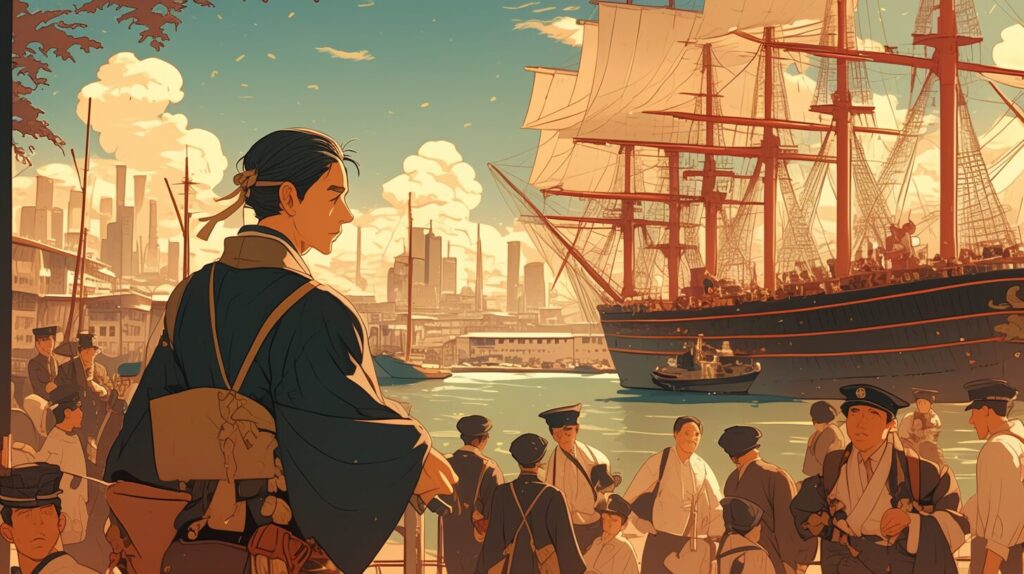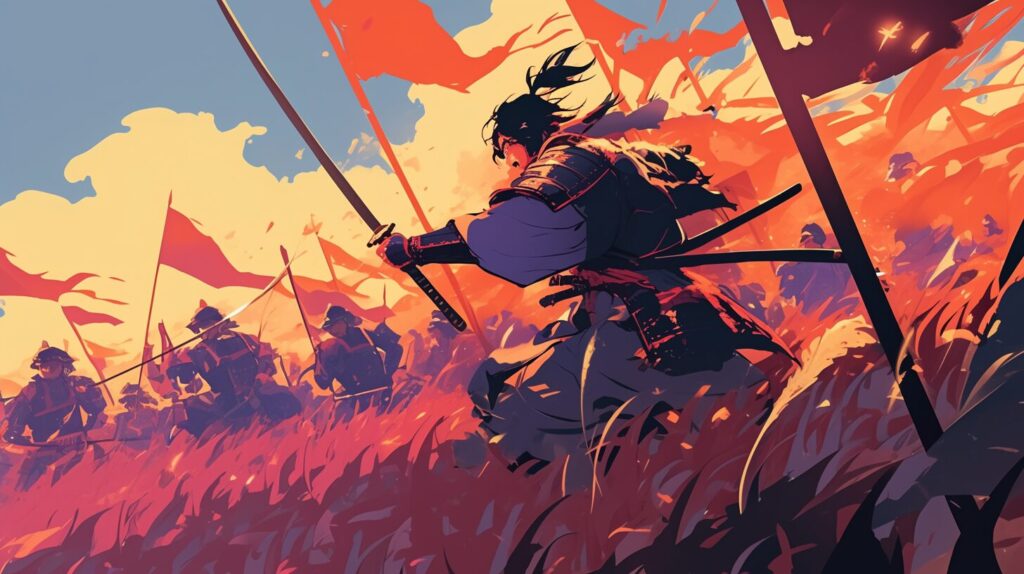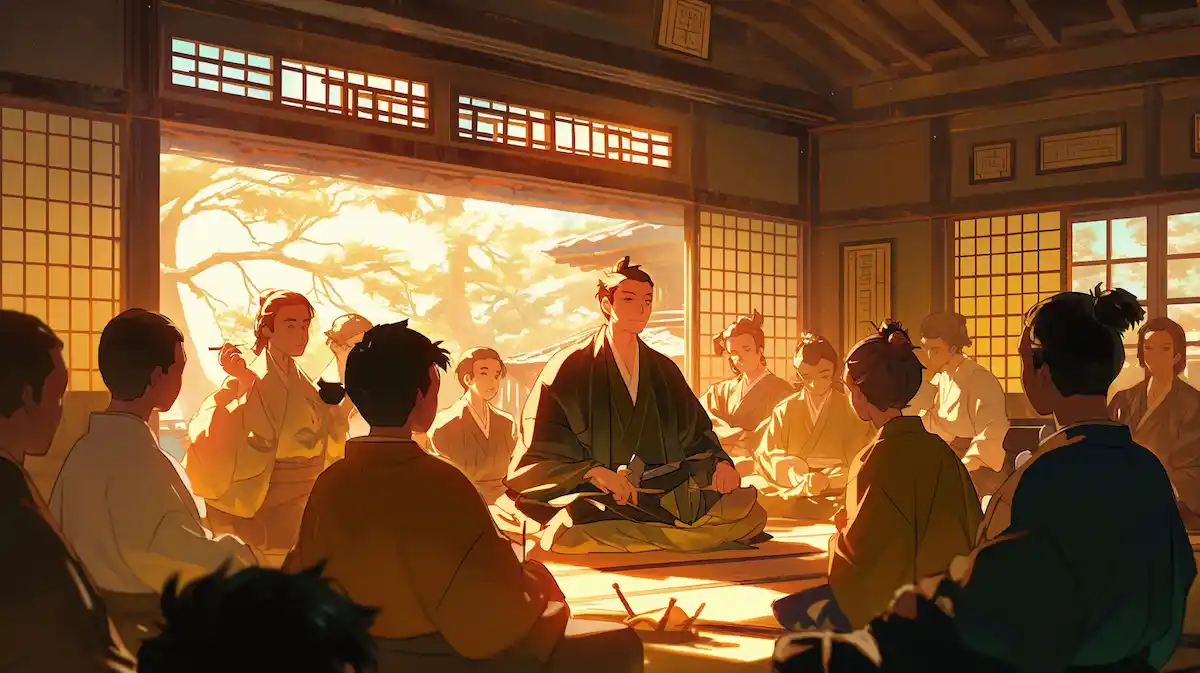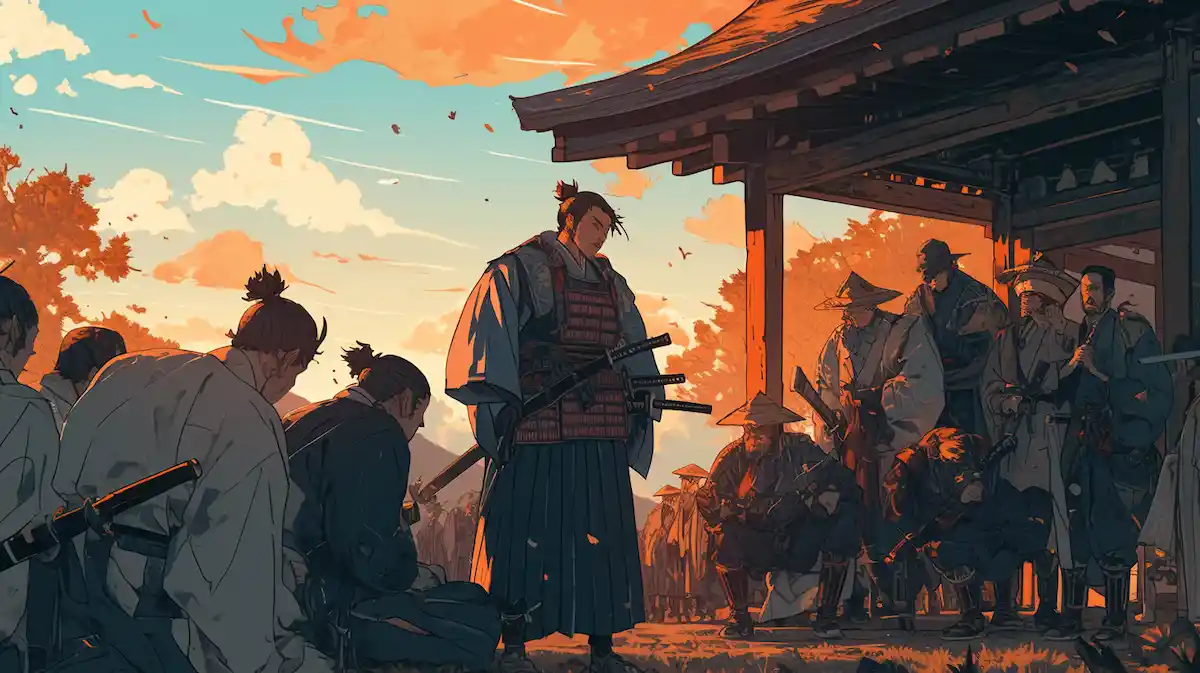高杉晋作を英語で説明・紹介するための基本情報と、英会話に役立つ表現をシンプルでわかりやすい英語で紹介します。
英会話ダイアローグ・概要・10の質問を通して、高杉晋作に関する英語表現を学びます。
英語
英会話ダイアローグを読む前に知っておくと良い前提知識と情報です。
- 高杉晋作の基本情報
- 1839年に長州藩(現在の山口県)の上級武士の家に生まれ、藩校「明倫館」で学び、その後吉田松陰の私塾「松下村塾」に入った
- 幕末の日本で、幕府を倒し新しい時代を作ることを目指した志士の一人
- 1867年、結核により27歳で亡くなった、短い人生で多大な影響を与えた人物
- 時代背景
- 幕末期の状況:
- 江戸時代後期、日本はペリー来航をきっかけに西洋列強の圧力を受け、国内で「攘夷(外国を排除する)」や「開国」を巡る議論が活発化
- 長州藩の位置付け:
- 高杉の属した長州藩は、倒幕運動の中心的な役割を果たした、高杉はその中で主導的な役割を担った
- 幕末期の状況:
- 高杉晋作の主な功績
- 奇兵隊の創設:
- 高杉は「奇兵隊」という部隊を結成、これは身分に関係なく、農民や商人も含めた画期的な軍事組織
- 功山寺挙兵:
- 長州藩内の保守派に対抗するため、少人数で挙兵し、改革派の勝利を導いた
- 近代化への転換:
- 高杉は中国の上海を訪れ、西洋の技術や文化を目の当たりにし、開国・近代化の重要性に気づいた
- 奇兵隊の創設:
- 高杉晋作の人物像
- ユーモアとカリスマ性:
- 高杉は明るくユーモアに富んだ性格で、友人や部下に慕われた、例えば、頭を剃って僧侶の格好で抗議を行うなどのエピソードがある
- 辞世の句:
- 「おもしろき こともなき世を おもしろく」という辞世の句は、彼の人生観をよく表している
- ユーモアとカリスマ性:
2人が高杉晋作について話しています。
高杉晋作の生い立ちから松下村塾でのまなび、吉田松陰からの影響、奇兵隊の創設やユーモアに富んだ性格、辞世の句などを話題にしてきます。
会話 / dialogue

Hey Key, I’ve been reading about Takasugi Shinsaku lately. He seems like such a fascinating person, but I feel like I only know the basics. Can you tell me more about him?

Sure, Mack! Takasugi Shinsaku was a samurai from the Chōshū Domain, and he’s one of the most important figures in Japan’s transition to the modern era. He was born in 1839 to an upper-class samurai family.

Oh, so he came from privilege. Did that make it easier for him to succeed?

In some ways, yes. He studied at Meirinkan, the Chōshū Domain’s school for samurai, and later joined Shōka Sonjuku, a private school run by Yoshida Shōin. Yoshida was a famous teacher who inspired many students to fight for Japan’s future. Takasugi really admired him.

What kind of influence did Yoshida have on him?

Yoshida taught Takasugi about respecting the Emperor and the importance of action. When Yoshida was executed in 1859, it deeply impacted Takasugi. He carried Yoshida’s ideas forward, especially the belief that Japan needed to change and modernize.

Modernize? But wasn’t Takasugi originally against foreign influence?

He was at first. Like many at the time, he supported sonnō jōi, the idea of expelling foreigners. But when he visited Shanghai, he saw how powerful Western technology and systems were. He realized Japan needed to open up and learn from the world to survive.

That’s pretty open-minded for a samurai. Did he act on those ideas?

Absolutely. One of his biggest achievements was creating the Kiheitai, a militia that accepted people from all social classes—farmers, merchants, even townspeople. This was revolutionary in a society where samurai were the ruling class.

That must have been controversial.

Very. He faced resistance, even within Chōshū. In 1864, the conservative leaders in the domain wanted to side with the shogunate, but Takasugi believed in fighting for change. He led the Kōzanji Rebellion with just a small group of followers and won. It’s one of his most famous acts of bravery.

He sounds fearless. Was he always so serious, though?

Not at all. Takasugi was known for his humor and charisma. There’s a story about him shaving his head and dressing like a monk to protest a decision he didn’t agree with. He had a way of making bold statements with a touch of humor.

That’s hilarious! No wonder people liked him. What about his later years?

Sadly, he didn’t live long. He died of tuberculosis in 1867 at just 27. But even at the end, he stayed positive. His famous death poem is, “Even in a boring world, I will make it fun.”

That’s such a powerful mindset. No wonder he’s so respected. Did his efforts pay off?

Definitely. His actions and leadership helped Chōshū become a key player in the Meiji Restoration, which ended the shogunate and modernized Japan. People still visit places like Shōka Sonjuku and his grave to honor him.

I’d love to visit those spots someday. Takasugi’s story is inspiring, especially how he balanced bold action with a sense of humor.

It really is. He’s proof that even a short life can have a huge impact if you live with courage and vision.

Thanks, Key. I feel like I understand Takasugi Shinsaku so much better now. He’s definitely someone worth learning more about!
概要 / Overview
「高杉晋作」について、理解を深めるための「英語での概要」です。
高杉晋作

Early Life
Takasugi Shinsaku was born in 1839 in the Chōshū Domain (modern Yamaguchi Prefecture) to an upper-class samurai family. He received a strong education at Meirinkan, the domain’s school for samurai, and later studied at Shōka Sonjuku, a private school run by Yoshida Shōin. Yoshida was a famous teacher who inspired many students to fight for Japan’s future. Takasugi admired him deeply and was influenced by his ideas of respecting the Emperor and taking bold actions.
His Visit to Shanghai and Changing Ideas
At first, Takasugi believed in sonnō jōi, the idea of expelling foreigners. This was a common belief in Japan at the time. However, in 1862, he visited Shanghai and saw how powerful Western countries were. He realized that Japan could not survive by rejecting foreign influence. Instead, Japan needed to modernize and learn from the West. This trip changed his ideas and made him one of the first samurai to advocate for opening Japan to the world.
The Kiheitai Militia
One of Takasugi’s greatest achievements was the creation of the Kiheitai, a militia that accepted people from all social classes. Farmers, merchants, and townspeople could join, which was revolutionary in a society dominated by samurai. The Kiheitai played an important role in the fight against the Tokugawa shogunate, and its success showed the importance of teamwork beyond social boundaries.
Bold Actions and Leadership
In 1864, Takasugi led the Kōzanji Rebellion. At the time, conservative leaders in Chōshū wanted to side with the Tokugawa shogunate, but Takasugi believed in fighting for change. With only a small group of followers, he defeated the conservatives and helped align Chōshū with the anti-shogunate movement. His courage and leadership inspired many people.
His Legacy
Sadly, Takasugi died of tuberculosis in 1867 at the young age of 27. Despite his short life, his ideas and actions played a key role in the Meiji Restoration, which ended Japan’s feudal system and modernized the country. His famous death poem, “Even in a boring world, I will make it fun; the way to live depends on the heart,” reflects his positive and bold personality. Today, he is remembered as a symbol of courage, innovation, and change.
10の質問 / 10 questions
「高杉晋作」について、理解を深めるための「英語での10の質問」です。
1. Who was Takasugi Shinsaku?
Takasugi Shinsaku was a samurai from the Chōshū Domain in Japan during the late Edo period. He played a key role in the movement to overthrow the Tokugawa shogunate.
2. When was Takasugi Shinsaku born?
He was born in 1839 in the Chōshū Domain, which is now part of Yamaguchi Prefecture.
3. What was the Kiheitai?
The Kiheitai was a militia formed by Takasugi that accepted members from all social classes, including farmers and merchants. This was unusual in a society traditionally led by samurai.
4. Why did Takasugi visit Shanghai in 1862?
He went to Shanghai to observe Western countries and their technologies. This experience changed his views, leading him to support modernization in Japan.
5. What was Takasugi's role in the Meiji Restoration?
Takasugi’s actions and leadership helped weaken the Tokugawa shogunate, paving the way for the Meiji Restoration, which modernized Japan.
6. How did Takasugi's education influence him?
He studied under Yoshida Shōin at Shōka Sonjuku, where he learned about loyalty to the Emperor and the importance of taking action, shaping his future endeavors.
7. What was Takasugi's famous death poem?
His death poem was, “Even in a boring world, I will make it fun; the way to live depends on the heart,” reflecting his positive and bold personality.
8. How did Takasugi die?
He died of tuberculosis in 1867 at the age of 27.
9. What was the Kōzanji Rebellion?
In 1864, Takasugi led a small group in the Kōzanji Rebellion against conservative forces in Chōshū, successfully promoting reformist ideas.
10. Why is Takasugi Shinsaku remembered today?
He is remembered as a symbol of courage, innovation, and change, having significantly contributed to Japan’s transition from a feudal society to a modern nation.

和訳付
会話 / dialogue

Hey Key, I’ve been reading about Takasugi Shinsaku lately. He seems like such a fascinating person, but I feel like I only know the basics. Can you tell me more about him?
ねえキー、最近高杉晋作について読んでるんだけど、すごく魅力的な人物だと思うんだ。でも、まだ基本的なことしか知らなくてさ。もっと詳しく教えてくれる?

Sure, Mack! Takasugi Shinsaku was a samurai from the Chōshū Domain, and he’s one of the most important figures in Japan’s transition to the modern era. He was born in 1839 to an upper-class samurai family.
もちろんだよ、マック!高杉晋作は長州藩の武士で、日本が近代化に向かう時代の中でも特に重要な人物の一人なんだ。1839年に上級武士の家に生まれたんだよ。

Oh, so he came from privilege. Did that make it easier for him to succeed?
なるほど、特権階級に生まれたんだね。それで成功しやすかったのかな?

In some ways, yes. He studied at Meirinkan, the Chōshū Domain’s school for samurai, and later joined Shōka Sonjuku, a private school run by Yoshida Shōin. Yoshida was a famous teacher who inspired many students to fight for Japan’s future. Takasugi really admired him.
ある意味ではそうだね。彼は長州藩の藩校「明倫館」で学び、その後吉田松陰が運営する私塾「松下村塾」に入ったんだ。吉田松陰は多くの生徒に日本の未来のために戦うことを教えた有名な先生で、高杉も彼を本当に尊敬していたんだよ。

What kind of influence did Yoshida have on him?
吉田松陰は高杉にどんな影響を与えたの?

Yoshida taught Takasugi about respecting the Emperor and the importance of action. When Yoshida was executed in 1859, it deeply impacted Takasugi. He carried Yoshida’s ideas forward, especially the belief that Japan needed to change and modernize.
吉田松陰は、高杉に天皇を尊重することや行動の重要性を教えたんだ。1859年に吉田が処刑されたとき、高杉は大きな衝撃を受けたけど、彼の思想を引き継いでいった。特に、日本を変え、近代化する必要性を信じ続けたんだ。

Modernize? But wasn’t Takasugi originally against foreign influence?
近代化?でも高杉はもともと外国の影響を排除したいと思ってたんじゃないの?

He was at first. Like many at the time, he supported sonnō jōi, the idea of expelling foreigners. But when he visited Shanghai, he saw how powerful Western technology and systems were. He realized Japan needed to open up and learn from the world to survive.
確かに最初はそうだった。彼も当時の多くの人たちのように「尊王攘夷」、つまり外国人を排除する思想を支持していたんだ。でも上海を訪れたとき、西洋の技術や仕組みのすごさを目の当たりにして、日本が生き残るためには世界から学び、国を開く必要があると気づいたんだよ。

That’s pretty open-minded for a samurai. Did he act on those ideas?
それって武士としてはかなり柔軟な考えだよね。そのアイデアを実行に移したの?

Absolutely. One of his biggest achievements was creating the Kiheitai, a militia that accepted people from all social classes—farmers, merchants, even townspeople. This was revolutionary in a society where samurai were the ruling class.
その通りだよ。彼の最大の功績の一つは「奇兵隊」を作ったことなんだ。この部隊は農民や商人、町人など、あらゆる身分の人を受け入れたんだ。武士が支配階級だった時代には革命的なことだったよ。

That must have been controversial.
それってかなり物議を醸したんじゃない?

Very. He faced resistance, even within Chōshū. In 1864, the conservative leaders in the domain wanted to side with the shogunate, but Takasugi believed in fighting for change. He led the Kōzanji Rebellion with just a small group of followers and won. It’s one of his most famous acts of bravery.
うん、すごく反発されたよ。長州の中でも保守派は反対してたんだ。1864年、藩内の保守派は幕府に従うことを望んでいたけど、高杉は変革のために戦うべきだと信じていた。彼は少数の仲間と共に「功山寺挙兵」を行い、勝利したんだ。それは彼の最も有名な勇敢な行動の一つだね。

He sounds fearless. Was he always so serious, though?
彼って本当に恐れ知らずだね。でも、いつもそんなに真面目だったの?

Not at all. Takasugi was known for his humor and charisma. There’s a story about him shaving his head and dressing like a monk to protest a decision he didn’t agree with. He had a way of making bold statements with a touch of humor.
全然そんなことないよ。高杉はユーモアとカリスマ性でも知られていたんだ。ある決定に反対したとき、頭を剃って僧侶の格好をして抗議したという話もあるよ。ユーモアを交えながら大胆な行動をするのが彼らしいんだ。

That’s hilarious! No wonder people liked him. What about his later years?
それって面白いね!そりゃあ人に好かれるよね。晩年はどうだったの?

Sadly, he didn’t live long. He died of tuberculosis in 1867 at just 27. But even at the end, he stayed positive. His famous death poem is, “Even in a boring world, I will make it fun.”
残念ながら、彼は長生きしなかったんだ。1867年、27歳の若さで結核で亡くなった。でも最期まで前向きだったよ。有名な辞世の句が「おもしろき こともなき世を おもしろく」なんだ。

That’s such a powerful mindset. No wonder he’s so respected. Did his efforts pay off?
それってすごく前向きな考え方だね。尊敬されるのも納得だよ。彼の努力は実を結んだの?

Definitely. His actions and leadership helped Chōshū become a key player in the Meiji Restoration, which ended the shogunate and modernized Japan. People still visit places like Shōka Sonjuku and his grave to honor him.
もちろんだよ。彼の行動とリーダーシップが、長州藩を明治維新の中心的存在にしたんだ。それによって幕府が終わり、日本が近代化した。今でも「松下村塾」や彼の墓を訪れる人は多いよ。

I’d love to visit those spots someday. Takasugi’s story is inspiring, especially how he balanced bold action with a sense of humor.
いつかその場所を訪れてみたいな。高杉の話って本当に感動的だよね。大胆な行動とユーモアをうまく両立させてるのがすごい。

It really is. He’s proof that even a short life can have a huge impact if you live with courage and vision.
本当にそうだよ。短い人生でも、勇気とビジョンを持って生きれば大きな影響を与えられるってことを証明してるよね。

Thanks, Key. I feel like I understand Takasugi Shinsaku so much better now. He’s definitely someone worth learning more about!
ありがとう、キー。高杉晋作のことがすごくよく分かったよ。本当にもっと知りたいと思える人物だね!
概要 / Overview
高杉晋作

Early Life
Takasugi Shinsaku was born in 1839 in the Chōshū Domain (modern Yamaguchi Prefecture) to an upper-class samurai family. He received a strong education at Meirinkan, the domain’s school for samurai, and later studied at Shōka Sonjuku, a private school run by Yoshida Shōin. Yoshida was a famous teacher who inspired many students to fight for Japan’s future. Takasugi admired him deeply and was influenced by his ideas of respecting the Emperor and taking bold actions.
幼少期
高杉晋作は1839年、長州藩(現在の山口県)の上級武士の家に生まれました。彼は長州藩の藩校「明倫館」でしっかりとした教育を受け、その後、吉田松陰が主宰する私塾「松下村塾」で学びました。吉田松陰は多くの生徒に日本の未来のために戦うことを教えた有名な先生であり、高杉は彼を深く尊敬し、その思想に大きな影響を受けました。
His Visit to Shanghai and Changing Ideas
At first, Takasugi believed in sonnō jōi, the idea of expelling foreigners. This was a common belief in Japan at the time. However, in 1862, he visited Shanghai and saw how powerful Western countries were. He realized that Japan could not survive by rejecting foreign influence. Instead, Japan needed to modernize and learn from the West. This trip changed his ideas and made him one of the first samurai to advocate for opening Japan to the world.
上海訪問と思想の変化
当初、高杉は「尊王攘夷」(外国人排除)の思想を信じていました。これは当時の日本で一般的な考え方でした。しかし、1862年に上海を訪れた際、西洋諸国の力強さを目の当たりにしました。高杉は、日本が外国の影響を拒むだけでは生き残れないことに気づきました。その代わりに、日本は近代化し、西洋から学ぶ必要があると考えるようになったのです。この旅は彼の考えを変え、日本を開国すべきだと主張した最初の侍の一人になりました。
The Kiheitai Militia
One of Takasugi’s greatest achievements was the creation of the Kiheitai, a militia that accepted people from all social classes. Farmers, merchants, and townspeople could join, which was revolutionary in a society dominated by samurai. The Kiheitai played an important role in the fight against the Tokugawa shogunate, and its success showed the importance of teamwork beyond social boundaries.
奇兵隊の創設
高杉の最大の功績の一つは、「奇兵隊」という部隊を創設したことです。この部隊は、身分に関係なく農民、商人、町人でも参加できました。これは武士が支配的だった社会において革命的な取り組みでした。奇兵隊は幕府との戦いで重要な役割を果たし、身分を超えたチームワークの大切さを示しました。
Bold Actions and Leadership
In 1864, Takasugi led the Kōzanji Rebellion. At the time, conservative leaders in Chōshū wanted to side with the Tokugawa shogunate, but Takasugi believed in fighting for change. With only a small group of followers, he defeated the conservatives and helped align Chōshū with the anti-shogunate movement. His courage and leadership inspired many people.
大胆な行動とリーダーシップ
1864年、高杉は「功山寺挙兵」を主導しました。当時、長州藩の保守派は幕府に従うことを望んでいましたが、高杉は変革のために戦うべきだと考えていました。少数の仲間とともに保守派を打ち破り、長州藩を倒幕運動の中心に導きました。彼の勇気とリーダーシップは多くの人々を感動させました。
His Legacy
Sadly, Takasugi died of tuberculosis in 1867 at the young age of 27. Despite his short life, his ideas and actions played a key role in the Meiji Restoration, which ended Japan’s feudal system and modernized the country. His famous death poem, “Even in a boring world, I will make it fun; the way to live depends on the heart,” reflects his positive and bold personality. Today, he is remembered as a symbol of courage, innovation, and change.
彼の遺産
残念ながら、高杉は1867年に27歳の若さで結核により亡くなりました。短い人生でしたが、彼の思想と行動は「明治維新」において重要な役割を果たし、日本の封建制度を終わらせ、近代化を進めました。有名な辞世の句「おもしろき こともなき世を おもしろく、住みなすものは心なりけり」は、彼の前向きで大胆な性格をよく表しています。現在でも、高杉は勇気、革新、変革の象徴として記憶されています。
10の質問 / 10 questions
1: Who was Takasugi Shinsaku?
高杉晋作とは誰ですか?
Takasugi Shinsaku was a samurai from the Chōshū Domain who played a key role in overthrowing the Tokugawa shogunate and modernizing Japan during the late Edo period.
高杉晋作は長州藩の侍で、幕末に幕府を倒し、日本を近代化する上で重要な役割を果たした人物です。
2: When was Takasugi Shinsaku born?
高杉晋作はいつ生まれましたか?
He was born in 1839 in the Chōshū Domain, which is now part of Yamaguchi Prefecture.
彼は1839年に長州藩(現在の山口県)で生まれました。
3: What was the Kiheitai?
奇兵隊とは何ですか?
The Kiheitai was a revolutionary militia formed by Takasugi that allowed people of all social classes, including farmers and merchants, to join.
奇兵隊は高杉が結成した革新的な部隊で、農民や商人を含むすべての社会階層の人々が参加できました。
4: Why did Takasugi visit Shanghai in 1862?
高杉晋作は1862年に上海を訪れた理由は何ですか?
He visited Shanghai to observe Western technology and systems, which changed his perspective and made him support modernization.
彼は西洋の技術や制度を観察するために上海を訪れ、それが彼の考えを変え、近代化を支持するようになりました。
5: What did Takasugi learn from Yoshida Shōin?
高杉晋作は吉田松陰から何を学びましたか?
Takasugi learned about loyalty to the Emperor, the importance of action, and the need for reform, which influenced his later leadership.
高杉は、天皇への忠誠、行動の重要性、改革の必要性について学び、後のリーダーシップに影響を与えました。
6: What was the Kōzanji Rebellion?
功山寺挙兵とは何ですか?
The Kōzanji Rebellion was an uprising led by Takasugi in 1864 to defeat conservative leaders in Chōshū and push for reform.
功山寺挙兵は、1864年に高杉が主導し、長州藩の保守派を打倒して改革を推進した反乱です。
7: What was Takasugi's famous death poem?
高杉晋作の有名な辞世の句は何ですか?
His famous death poem is, “Even in a boring world, I will make it fun; the way to live depends on the heart.”
彼の有名な辞世の句は「おもしろき こともなき世を おもしろく、住みなすものは心なりけり」です。
8: How did Takasugi die?
高杉晋作はどのように亡くなりましたか?
He died of tuberculosis in 1867 at the young age of 27.
彼は1867年、27歳の若さで結核により亡くなりました。
9: Why is Takasugi remembered as a revolutionary?
高杉晋作はなぜ革命的な人物として記憶されているのですか?
He is remembered for his bold actions, such as creating the Kiheitai and leading the Kōzanji Rebellion, which contributed to the Meiji Restoration.
彼は奇兵隊の創設や功山寺挙兵などの大胆な行動を通じて明治維新に貢献し、記憶されています。
10: What is Takasugi’s legacy today?
高杉晋作の現在の遺産とは何ですか?
Takasugi is remembered as a symbol of courage and innovation. His ideas helped transform Japan into a modern nation.
高杉は勇気と革新の象徴として記憶されています。彼の思想は日本を近代国家へと変える手助けをしました。

words & phrases
英会話ダイアローグと関連情報に出てきた単語・フレーズです(例文は各3つ)。

privilege : 名詞
意味: 特権、恩恵。A special right, advantage, or benefit given to a particular person or group.
(高杉晋作が上級武士の家に生まれ、特権的な立場にあったことを指す)
例文:
- Being able to study at the top university is a privilege.
「一流大学で学べることは特権です。」 - He had the privilege of meeting the Emperor.
「彼は天皇に会うという特権を持っていました。」 - Wealth often comes with certain privileges.
「富はしばしば特定の特権を伴います。」
resistance : 名詞
意味: 抵抗、反対。The act of opposing or standing against something.
(高杉晋作が長州藩の保守派からの抵抗を受けたことを指す)
例文:
- The new law faced strong resistance from the public.
「その新しい法律は国民から強い抵抗を受けました。」 - He showed great resistance to the unfair decision.
「彼はその不公平な決定に強く抵抗しました。」 - The soldiers put up fierce resistance against the enemy.
「兵士たちは敵に対して激しく抵抗しました。」
hilarious : 形容詞
意味: とても面白い、爆笑ものの。Extremely funny and causing a lot of laughter.
(高杉晋作が僧侶の格好で抗議したエピソードの面白さを表す)
例文:
- That comedy show was absolutely hilarious!
「そのコメディ番組は本当に爆笑ものでした!」 - He told a hilarious joke at the party.
「彼はパーティーでとても面白いジョークを言いました。」 - Her reaction to the surprise was hilarious.
「サプライズに対する彼女の反応はとても面白かったです。」
tuberculosis : 名詞
意味: 結核。A serious infectious disease that mainly affects the lungs.
(高杉晋作が結核で27歳の若さで亡くなったことを指す)
例文:
- Tuberculosis was once a deadly disease with no cure.
「かつて結核は治療法のない致命的な病気でした。」 - He was diagnosed with tuberculosis and had to rest.
「彼は結核と診断され、休養を取らなければなりませんでした。」 - In the past, many people died from tuberculosis.
「昔は多くの人が結核で亡くなりました。」
pay off : 句動詞
意味: 報われる、成果を上げる。To bring a successful result after effort or investment.
(高杉晋作の努力が幕府の打倒や明治維新の成功に結びついたことを指す)
例文:
- His hard work finally paid off when he got the promotion.
「彼の努力はついに実を結び、昇進を果たしました。」 - All the training paid off when she won the championship.
「彼女が優勝したとき、それまでのトレーニングが報われました。」 - Their investment in technology paid off in the long run.
「彼らの技術投資は長期的に見て報われました。」
詳細情報 / Further Info
関連記事(吉田松陰)

